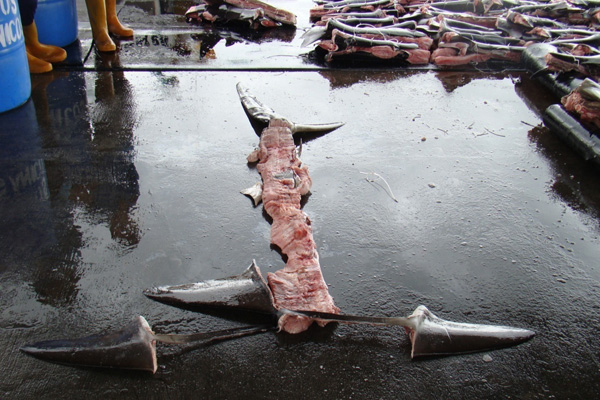Indonesia’s flag carrier won’t transport shark fins any more
Indonesia’s national carrier Garuda Indonesia has joined a growing number of airlines looking to curb the international shark fin trade by banning the transport of shark fins and other shark products on their aircraft.
WWF-Indonesia, which helped campaign for the ban, called the new Garuda policy a “major step forward to reducing the global market for shark products.” The airline had previously transported 36 tons of shark fin products a year, the conservation group said in a media release on Nov. 15.
“WWF-Indonesia commends this move by Garuda Indonesia. Their policy to cease transporting shark fin products is a positive step that should generate further momentum in the shark conservation movement,” Nazir Foead, WWF-Indonesia’s conservation director, said in the media release.

Great white shark in South Africa. Photo by Rhett A. Butler.
Demand for shark fin soup in East Asia, which is the main driver of the shark products trade, has taken a heavy toll on shark populations.
An estimated 100 million sharks are killed each year, according to data released in March. That number far exceeds sustainable levels, and conservationists believe that one third of all open-ocean shark species are at risk of extinction.
Recently, prices for shark fins have been falling in Hong Kong, the global hub of the shark fin trade. This may be a sign that international campaigns by environmental groups and regulations banning or limiting the sale of shark fins are succeeding in curbing demand.
However, despite falling prices for fins, Indonesia remains one of the world’s top exporters of shark fins and other shark products.
According to Indonesian government estimates, the country exported 434 tons of shark fins in 2012, worth around $6 million. In 2010, the United Nations Food and Agriculture Organization (FAO) identified Indonesia as the world’s number one shark catching country, catching an average of over 109,000 tons of sharks per year from 2000-2008.
But the country has started looking for ways to control shark fishing and the shark fin trade, in part due to pressure from WWF-Indonesia and its #SOSharks campaign.
Earlier this month, Indonesia’s Maritime Affairs and Fisheries Ministry announced it was considering a quota system and would issue a new regulation on shark fishing by the end of this year.
“We are still discussing the regulation with the Indonesian Institute of Sciences,” said Agus Dermawan, director of fish species conservation for the ministry, as quoted by the Jakarta Post on Nov. 4.

Great white shark in South Africa. Photo by Rhett A. Butler.
The institute, he said, would determine which shark species would be protected under the regulation. Those species could still be sold, but in limited numbers.
Whether such a system would work to control the shark fin trade remains to be seen, and even Agus admitted that enforcing the quota system would be difficult.
Poachers or traffickers of endangered animals generally operate with impunity in Indonesia. Cases involving protected animals are rarely brought to court and those who are charged are often exonerated or given light sentences.
“I don’t care about the regulation. As long as the demand in the village market is still robust I will catch and sell sharks,” 37-year-old Goro (not his real name), a fisherman from East Lombok in West Nusa Tenggara province told the Jakarta Post.
Goro explained that while he used to fish for tuna, declining numbers of fish had left him with no other choice but to catch sharks.
Over 3.8 million people work as fishermen in Indonesia, and overfishing and destructive fishing practices paired with pollution and the effects of climate change have left many fishers struggling to make a living.
“It is important to know that the fishermen are only workers. They have no choice because this is the job that will provide money for them,” secretary general of the People’s Coalition for Fisheries Justice Indonesia (KIARA) Abdul Halim told the Jakarta Post.
Abdul added that if they government wanted to reduce shark fishing, they must provide alternative opportunities to fishermen involved in the shark trade.


Shark finning technique where only a band of skin to keep the fin attached to the spine is retained and the remainder of the body discarded at sea. This method is aimed at circumventing legislation banning finning which states that the fins of the shark must be ‘naturally attached’ to the body. Images courtesy of INTERPOL.
While the details of the quota system have yet to be announced, Indonesia has already taken some steps to regulate shark fishing.
In February, the local government of Raja Ampat, a popular dive destination in West Papua province, prohibited all shark and manta ray fishing, declaring the entire district as a shark sanctuary.
And in May, Indonesia made it illegal to kill whale sharks (Rhincodon typus), adding the world’s largest fish to a list of protected species in the country that also includes the largetooth sawfish (Pristis microdon).
Jakarta’s Deputy Governor Basuki Tjahaja Purnama also announced in September that the Jakarta provincial government was preparing a bylaw to prohibit the consumption of shark fins in the capital.